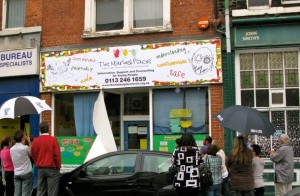
For my mum, it’s a gradual decline into the night. She has her bad days – when she’s convinced she’s about to leave school and needs to find a job – and her better days, where she can just about remember her grandchildren’s names. But she certainly no longer has days where anyone who talks to her, even for a minute or two, might think she’s capable of making a serious decision about the money she spends.
That’s why I was so shocked, when going through her mail recently, to find a letter from one of the UK’s best-known charities, Save the Children, thanking her for talking to one of its fundraisers about leaving a legacy. ‘As requested,’ it read, ‘I have also enclosed a codicil form.’
When I spoke to the charity and told them how disappointed I was that they were targeting a vulnerable elderly person, I discovered that my mother was on a list it had bought a couple of years ago. She’d been contacted, the charity admitted, ‘several times’ over the last few months by fundraisers working on their behalf about making a donation or setting up a direct debit. Save the Children, to its credit, reacted swiftly. It apologised and immediately took my mother off its list, conceding that its telemarketers ‘should have identified she was not capable of making these decisions’.
This was not the first time my mum has been on the receiving end of charity cold calls and has, according to the fundraisers involved, expressed interest in making a regular donation. I have power of attorney over her affairs, so I, on her behalf, continue to donate to those charities she had herself identified before her condition deteriorated and she’s never ended up spending money she can’t afford on new donations.
When I started to have a dig, I soon soon found my mum’s experience was not unique. Take a look at the Alzheimers Society chat forum, for example, and you’ll see pages of discussion about dementia sufferers being cold-called, with, in one case, a fundraiser for a reputable charity apparently going round door to door in a sheltered housing scheme and even filling in the direct debit form when the potential donor was unable to do so.
Charities use cold calling, whether it’s on the phone or at the door, because it’s effective. According to the Fundraising Standards Board, the independent self-regulatory body for UK fundraising, its members made more than 4.7 million fundraising phone calls in 2009, and more than 22 million door to door calls (including collections) – both significantly up on the previous year. But the number of complaints is up too. And with charities facing a squeeze on donations in these tough economic times, it’s not unreasonable to fear that the pressure on fundraisers to get results will increase.
The Charity Commission, in its guidelines on fundraising, says ‘charities should not use any methods of fundraising that may damage public trust and confidence in charities’ including ‘targeting and pressuring vulnerable donors who may not be able to afford or understand the terms of the donation or ongoing donations they are committed to’. And in its code of practice on legacies the Fundraising Standards Board says charities ‘ought to pay particular attention when communicating with vulnerable people’.
Charities may do the right thing when they’re challenged. But is the message getting through to the fundraising frontline? Professional fundraising companies which work on charities’ behalf say all the right things about ‘high quality’, ‘sensitive’ and ‘no pressure’ telephone fundraising. And the Direct Marketing Association’s code of practice specifically highlights the need to ‘take particular care with vulnerable customers’. But marketers are highly focused on results – donors signed up and cash raised – and as I’ve seen that means the reality can fall way short of the theory. It seems to me that the confusing array of organisations and codes – yet another self-regulatory body, the Public Fundraising Regulatory Association, oversees face-to-face fundraising – may be part of the problem. Shouldn’t the Charity Commission, which doesn’t directly regulate fundraising, have a more hands-on role?
Of course charities need to reach out to new donors and of course they need to use cost-effective means of doing so. But sensitivity, a strong ethical approach and good training are all essential. So too is a tough line on those marketing teams who don’t stick to the high standards charities subscribe to. Otherwise I’m not convinced a fundraiser, working for a telemarketing or door-to-door team, will really give the thought they should to the donor.
Charities are under pressure for cash. But they rely on goodwill and can’t afford to squander it with shoddy sales techniques.




